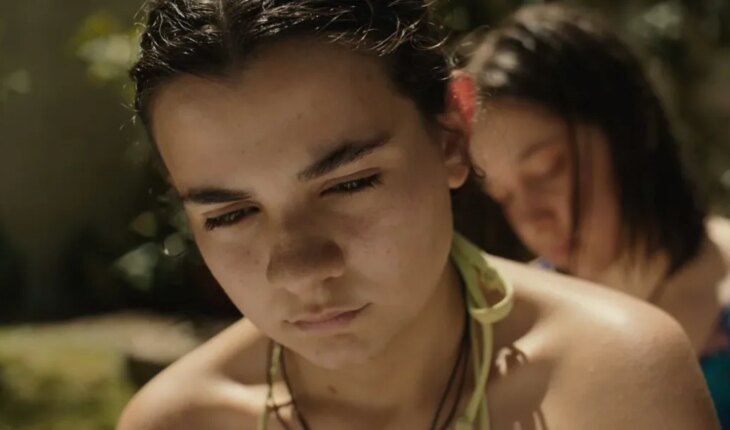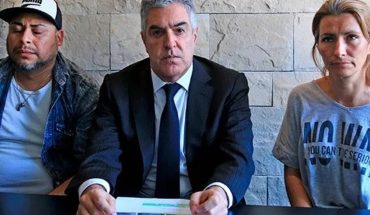Three generations of women, grandmother, mother and daughter, are lying down watching television on a hot afternoon set in the suburbs of the 90s. The camera pans over them from head to toe, until it reaches the attentive eyes of Lola, the 16-year-old girl who will be the protagonist of this story.– Ladislao, are you there?
– By your side, Camila.That’s the first image we see from the movie. Lola seeing Camila, a woman who back in the nineteenth century took risks for what she wanted, who disobeys what she was supposed to do, and who is punished and judged for it. That character built by María Luisa Bemberg in 1984, which resonates with the story of many other women who have been pigeonholed and silenced. From that point the protagonist of this story starts: while her mother and grandmother define the work as “Beautiful, but very sad,” The young woman gets up and leaves, full of doubts, fears, curiosities and questions about the world in which she lives, and the one that awaits her ahead. We are talking about “Germany”, the debut film by Maria Zanetti that has already been released in cinemas. It stars Maite Aguilar, a teenager who lives with her middle-class family, who goes to high school and who must take the subjects she has pending. Lola wants to travel, but her family, absorbed by the bipolar disorder faced by her older sister, Julieta (Miranda de la Serna), does not want her to make the trip, it is not the time. The instability and wear and tear in the bond with her family make Lola persist with her idea and go out in search of new experiences that give her another look at herself and the circumstances that surround her. The film, which also stars María Ucedo, Walter Jakob, Vicky Peña and Andy Pruss, premiered at the San Sebastian Festival and had an important run at festivals: it was awarded at the Mar del Plata International Film Festival, at the Ibero-American Film Festival (Ceará), at the Ibero-American Feature Film Competitive Festival and had a Special Jury Mention at the Punta del Este International Film Festival. Zanetti was also the screenwriter of this story, which is based on what she went through in real life from her brother’s bipolar disorder: “It was born from the need to reconstruct a part of my own story, especially from a specific moment in my adolescence that turned out to be a hinge in many ways,” the filmmaker told the press and continued: “I tried to reconstruct those years through images and memories that gravitate in my memory and that turned out to be the main triggers for this story.” Maria Zanetti – España | “Beyond the fact that the film is not focused on Lola’s relationship with her sister, perhaps the most unique thing is to tell that disorder through the eyes of a younger sister who is trying to decipher what is happening to her older sister at the same time that she is deciphering herself. It seems to me a look that has not been told so much until now,” he added. In conversation with Filo News, the director talked about what it was like to bring that story to the big screen, how she chose the casting and how she experienced the filming. In addition, Zanetti reflected on the importance of defending Argentine cinema in the face of the crisis, a critical scenario in the face of a paralyzed industry. You may also be interested in: Police repressed demonstrators at the Gaumont in defense of Argentine cinemaWhat can you tell us about yourself? How did you come to make your first feature? Why now? Scene from “Germany” | As a director, I started directing music videos and commercials, always with the desire to one day make my own film. I’ve been working as an author and screenwriter for a few years now and I enjoy it a lot, but directing is what I like the most, I love filming. I wrote this film during the pandemic, when I had a first version of the script, I spoke with Juan Pablo Miller from Tarea Fina and two days later he called me and told me that he wanted to produce my film. I was speechless on the phone, it was the emotion. I knew that if Juan Pablo took over the project, it was very likely that the film would be filmed. This story is a story that comes out of a very personal imaginary, I think it’s been in my head for a long time and I think that in the pandemic I found the time and temperance to sit down to write it. How was the casting process, how was the shooting? Scene from “Germany” | It was very important to be accompanied by a team of people who really felt crossed.And I think that later carried over to the screen. It was a long creative and collaborative work before and during filming. For example, with Agustin Barrutia, the cinematographer, we would get together or talk about the film once a week six months before filming, as well as with AD, Marchelo Pozzo. The same thing happened with Maite Aguilar, the protagonist. Maite became an actress filming Germany and for me what she does is brilliant, then when Miranda de la Serna appeared who plays the character of the sister and with her overwhelming talent, the film was finished in my head. It was a luxury to have Micaela Saiegh, the Art Director, and Patricia Conta, the costume designer, do an amazing job. The film is based on your experiences as a teenager. How did you experience this process, what was it like for you to build this story from family and personal memories? What did it mean for you to see the finished film? Scene from “Germany” | When I found the themes I wanted to explore and the point of view in the story, the writing flowed a lot, the dialogue with the characters in my head was very natural. I think it has to do with the fact that I tried to go through places crossed by an emotional nerve. Seeing the finished film was exciting, I’m very happy with the film we made, it’s very difficult to make a debut film, on top of the period, it touches on a complex subject and car scenes that we had to shoot in a short time. Every time I see it something different happens to me, but I love it, I love our film, I’m very proud and the team expresses the same feeling to me, it’s nice that shared feeling, it’s very much about cinema and the love that what we do generates. The film talks about mental health, independence, adolescent growth, a stage that you defined in the press release as “a long mourning.” What do you mean by that? What do you remember about that trip to Germany, do you feel like you changed after that? Scene from “Germany” | I feel like it’s a grief because there’s something that dies inside you when you start to see the world with more adult eyes. Like a certain capacity for surprise that is lost and a certain sharpness that appears in the way we look. The trip I made at the age of 16 was very revealing for me, it was six months away from my family, my friends, moving in a strange world with a different language, with another family, I don’t know, I was lucky. I remember really enjoying a certain autonomy and that no one knows me, as it allowed me to show myself in other ways, to try other things with less prejudice. We are currently going through a difficult time in the audiovisual industry. What does Argentine cinema mean to you and why is it important to defend it? Where or to whom would you like this film to reach? Scene from “Germany” | This film was a co-production with Spain, premiered at the San Sebastian Festival, was at the Mar del Plata Festival and has already been screened at more than 25 festivals and has also premiered in Spain in more than 20 theaters. All of this happened thanks to the support we had from INCAA. Having that support with a debut feature is key, because it’s the only way you can shoot a first film with a more professional production design. No films are being filmed in Argentina outside the private orbit. What we are asking now is for MPs to demand explanations from the executive as to why they are scrapping and paralysing a well-functioning industry that is admired in the rest of the world.
Original source in Spanish
María Zanetti presents “Germany”: “It’s a very personal story and it’s been in my head for a long time”
April 16, 2024 |





